 Petzlover
Petzlover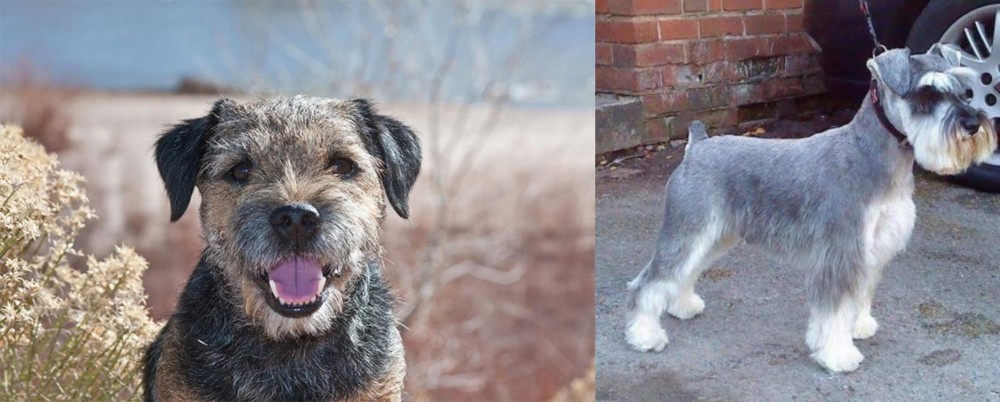 Border Terrier is originated from United Kingdom but Miniature Schnauzer is originated from Germany. Both Border Terrier and Miniature Schnauzer are having almost same height. Both Border Terrier and Miniature Schnauzer are having almost same weight. Both Border Terrier and Miniature Schnauzer has same life span. Both Border Terrier and Miniature Schnauzer has same litter size. Both Border Terrier and Miniature Schnauzer requires Moderate Maintenance.
Border Terrier is originated from United Kingdom but Miniature Schnauzer is originated from Germany. Both Border Terrier and Miniature Schnauzer are having almost same height. Both Border Terrier and Miniature Schnauzer are having almost same weight. Both Border Terrier and Miniature Schnauzer has same life span. Both Border Terrier and Miniature Schnauzer has same litter size. Both Border Terrier and Miniature Schnauzer requires Moderate Maintenance.
 As a working dog, the Border Terrier comes from the border country between England and Scotland. To be more specific, the dog originates from the rough hill country in the areas on both sides of the border between England and Scotland – an area known as 'The Border Country'. The breed was developed by the farmers, using the Terriers to help contain the fox population.
As a working dog, the Border Terrier comes from the border country between England and Scotland. To be more specific, the dog originates from the rough hill country in the areas on both sides of the border between England and Scotland – an area known as 'The Border Country'. The breed was developed by the farmers, using the Terriers to help contain the fox population.
It is believed that they are related to other kinds of terriers which also came from this region such as the Bedlington- and Dandie Dinmont Terriers. The first Border Terrier was registered in 1913 with the British Kennel Club. Later, the Border Terrier Club was also formed. A club for these dogs was also registered in the United States in 1930.
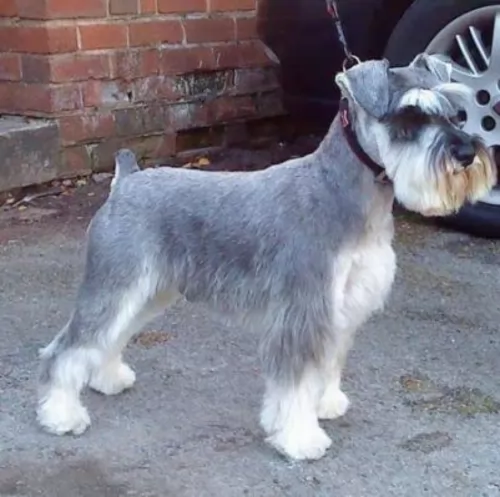 Miniature Schnauzers were first bred in Germany in the 19th century being bred from Affenpinschers and Standard Schnauzers.
Miniature Schnauzers were first bred in Germany in the 19th century being bred from Affenpinschers and Standard Schnauzers.
This dog was always used to control rats on farms, but these days he is more a companion. It is believed that the start of the modern Miniature Schnauzer in the United States was around 1924 when dogs were imported from Germany.
It was in 1933 that the Miniature Schnauzer was recognized by the AKC as a separate breed from the Standard Schnauzer.
 The Border Terrier is a small to medium sized dog, weighing roughly between 5- and 7kg and standing at anything between 28 and 40cm in height. With his dark brown eyes and keen, alert expression, and with ears dropping forward, people describe the head as being like that of an otter. He is a courageous worker and a loyal companion but some people may not take kindly to him wanting to dig under-, or climb over barriers to get out to follow a scent or to go exploring.
The Border Terrier is a small to medium sized dog, weighing roughly between 5- and 7kg and standing at anything between 28 and 40cm in height. With his dark brown eyes and keen, alert expression, and with ears dropping forward, people describe the head as being like that of an otter. He is a courageous worker and a loyal companion but some people may not take kindly to him wanting to dig under-, or climb over barriers to get out to follow a scent or to go exploring.
The Border Terrier is a rough coated dogs of medium size with narrow build. The dog’s height is slightly greater than the dog’s length. The coat can be tan and black or dark grey. Sometimes the coat is described as grizzle - dark tipped hairs which give an overlay of color to the tan or red coat. You can also possibly find some white on the muzzle or chest. He has a double coat, with the outer coat being short, dense and wiry. The tail is of medium length and the ears drop forward toward their cheeks.
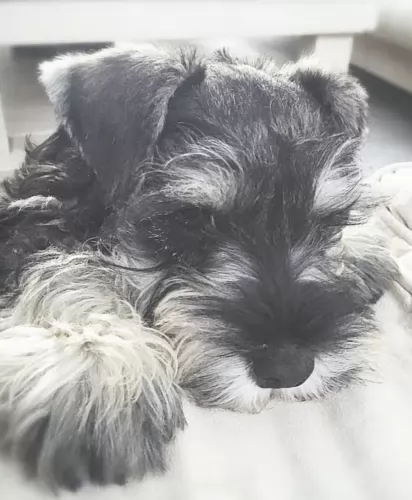 The Miniature Schnauzer is a small dog breed that stands between 30 to 36cm in height and weighs between 5 and 10kg.
The Miniature Schnauzer is a small dog breed that stands between 30 to 36cm in height and weighs between 5 and 10kg.
He has a sturdy body with a dense, wiry coat which most people prefer to have stripped. Because stripping is quite tedious, many of these dog owners prefer to have the coat clipped which actually gives the coat a greyish look to it.
The coat is usually a mix of black and silver. Some people refer to the Miniature Schnauzer as having a salt-and-pepper coat – hairs that are a mix of black and white. The dog has a double coat with the outer coat being wiry and the undercoat being a lot softer.
This is a dog that will need to be groomed frequently to prevent matting. A noticeable feature with these dogs is the rectangular shaped head with alert slanted eyes and bushy eyebrows, mustache and beard. In fact the word ‘Schnauzer’ means beard or muzzle.
The ears have been traditionally cropped but these days they are left and then they tend to be half-erect, half-floppy.
This is a tough little dog, fearless, cheeky, arrogant, alert and also friendly. A draw-card with him is that he is considered as a low-shedder and being hypoallergenic.
They’re very intelligent dogs too and will learn quickly when you give him training and socialization. This is important for a dog like this as he can quickly show you that he is strong willed and independent. Training and socialization makes him much nicer as he becomes more balanced and obedient.
He is full of life and extroverted and you can count on him to join you wherever you are and whatever you’re doing. Whether watching TV, swimming or hiking, he’ll be there and turn every occasion into a festive event. He is a loving, loyal dog, making a splendid pet.
He's protective of his human family and tends to be suspicious of strangers, and this is what makes him such a great watchdog.
 A Border Terrier is a dog that has to be part of the family. You can’t just stick him in your back yard as he will just pine away with unhappiness. Boredom and loneliness will cause him to bark and he has a loud bark. He’ll become destructive – characteristics that aren’t his fault because he didn’t ask to be bought and just stuck away.
A Border Terrier is a dog that has to be part of the family. You can’t just stick him in your back yard as he will just pine away with unhappiness. Boredom and loneliness will cause him to bark and he has a loud bark. He’ll become destructive – characteristics that aren’t his fault because he didn’t ask to be bought and just stuck away.
Train and socialize your Border Terrier so that he becomes the great dog he is intended to be. He gets on well will children who have been taught to be kind to animals and he will get along with other pets in the home. The Border Terrier is an affectionate, sensitive dog and once trained he is willing to obey your commands.
The Border Terrier isn’t the greatest guard dog but is best known for his loving, devoted and loyal nature. He loves his food, and if you feed him well, provide him with a warm, dry place to sleep and provide him with lots of attention and exercise, you’ll have the most devoted and loving friend for life.
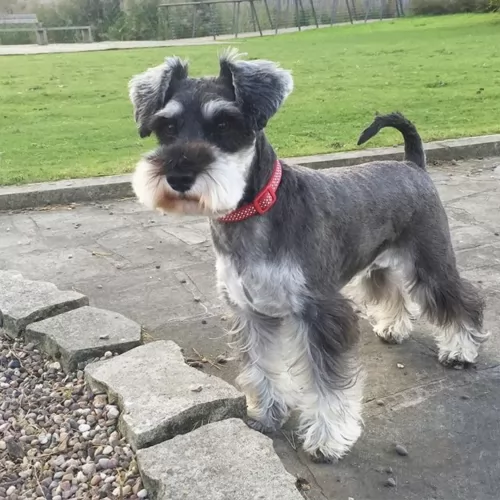 Miniature Schnauzers are such adaptable little dogs, quite happy to make a home with you in the city or in the countryside.
Miniature Schnauzers are such adaptable little dogs, quite happy to make a home with you in the city or in the countryside.
They’re sociable dogs, so just being with his human family wherever they are will suit him well. If he lives in the city however, he will need to have a walk everyday or taken to the park for a run.
He is also a dog that scarcely sheds, so he suits people battling with allergies. With an average life expectancy of 12 to 14 years, if you nurture your Mini Schnauzer and give him the best food and exercise there is, as well as loving him, you’re going to have a loyal and devoted pet.
 Border Terriers are a healthy breed and with good food and plenty of love and attention, they can reach 14 years of age. It is to be noted with this dog breed that he doesn’t show signs of pain or sickness easily so you want to watch him closely.
Border Terriers are a healthy breed and with good food and plenty of love and attention, they can reach 14 years of age. It is to be noted with this dog breed that he doesn’t show signs of pain or sickness easily so you want to watch him closely.
Canine Epileptoid Cramping Syndrome - This is a disease which can be evident from 7 months of age already. The disease was once known as Spike's Disease, and its an hereditary disease of Border Terrier dogs. The cause of the disease is unknown but it is similar to canine epilepsy. It is thought that a contributing factor can be gluten, so a gluten-free diet will be recommended.
Heart defects can also affect Border Terriers, one of which is pulmonic stenosis. This is a narrowing of the valve which separates the right chamber of the heart from the lungs. It can ultimately lead to arrhythmia to congestive heart failure. He’ll have difficulty with breathing, suffer from abdominal distension and won’t be able to exercise properly.
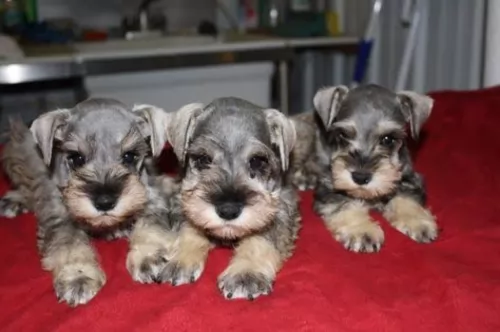 Your Miniature Schnauzer is pretty healthy and he isn’t likely to cost you much in terms of vet fees. There are however some common dog problems that you want to be aware of such as cataracts of the eye and hypothyroidism.
Your Miniature Schnauzer is pretty healthy and he isn’t likely to cost you much in terms of vet fees. There are however some common dog problems that you want to be aware of such as cataracts of the eye and hypothyroidism.
This a a problem in the lens of the eye. The lens should be clear, and when a dog has a cataract, it obscures the vision. The size of the cataract can lead to blindness.
Diabetes in a dog can bring on cataracts as can genetics or damage to the eye from exposure to ultraviolet light. Fortunately, dogs with cataracts can still see. Dogs with old cataracts can have surgery to remove them.
When a dog owner suspects a cataract in their pet’s eye it is best to treat it immediately with anti-inflammatory dog cataract eye drops. Cataracts never go away however without surgery.
The thyroid gland in the neck produces a hormone called thyroxine. It controls metabolism, but with hypothyroidism, enough of the hormone isn’t made. Its a common disease which affects all dog breeds.
Signs of hypothyroidism include hair loss, weight gain, intolerance to cold and a troublesome skin. To have the disease diagnosed, the vet will do a series of blood tests.
 Because the topcoat of the Border Terrier is dense and harsh with a thick undercoat, he will require moderate grooming. He doesn’t shed too much. Brush your Border Terrier twice a week to remove dead hair and keep your dog’s coat healthy. As part of his grooming, keep his nails clipped as well as his teeth checked and brushed at least twice a week. Make use of specialized dog toothpaste and brush.
Because the topcoat of the Border Terrier is dense and harsh with a thick undercoat, he will require moderate grooming. He doesn’t shed too much. Brush your Border Terrier twice a week to remove dead hair and keep your dog’s coat healthy. As part of his grooming, keep his nails clipped as well as his teeth checked and brushed at least twice a week. Make use of specialized dog toothpaste and brush.
The Border Terrier can quickly put on weight so it is important to feed him according to the instructions on the packaging if you’re going to be feeding him with commercially manufactured dog food. Make sure its a quality brand and one which caters for his energy requirements.Dogs are individuals, and they don’t all eat the same amount. As a responsible dog owner, it is up to you to monitor your pet and understand his unique requirements.
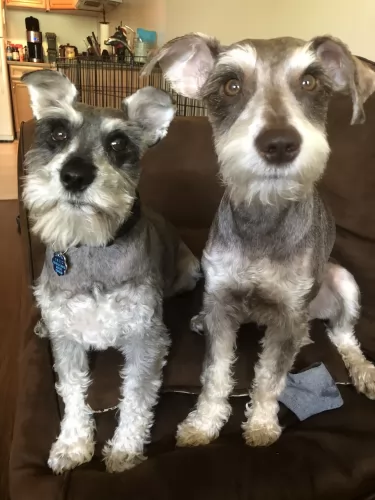 Let’s look at several ways you need to care for your Miniature Schnauzer -
Let’s look at several ways you need to care for your Miniature Schnauzer -
Make sure you have his puppy injections on time. This means knowing which veterinarian you’ll use. Later on if you don’t want to go in for breeding, you will need to have your pet spayed or neutered.
Make sure you have a nice warm, dry spot for your dog to sleep. It can be a cardboard box, or you can buy a dog basket or sleeping platform. Make sure your pet loves it and knows he can retreat to it anytime he wants.
If he goes outside for a few hours, make sure that he has a place to lie in the shade and away from the elements.
Good food promotes good health and longevity. You can feed your pet one of the top quality commercially manufactured foods and give your pet some variety by adding in some boiled chicken, vegetables and brown rice. Some raw meat occasionally can also be excellent for your pet.